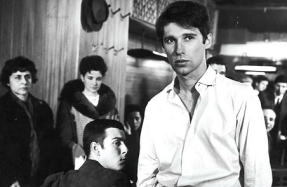
About 30 minutes into Laura Citarella’s first feature Ostende (2011), a waiter named Paco (Julián Tello) asks one of his customers, Laura (Laura Peredes), if he can tell her an idea he has for a movie. As Paco explains, the film will begin at night, with a man in a yellow truck approaching a desert crossroads. To the left, a fire; to the right, darkness; and, in the distance, screams. Concerned, the man drives toward the blaze, where he comes upon a group of priests and a mysterious Dutchman conducting a grisly ritual involving torture and a burning car. When he attempts to leave, the man is knocked unconscious. The screen then cuts to black and the title card appears. “And then…?” asks Laura. “And then what?” Paco replies. “The story…what happens next?” Laura implores. “Oh…that’s all I got,” Paco responds. “I don’t want to put too much pressure on it.”

As a plot point, Paco’s story is largely inconsequential to Ostende’s greater arc—which otherwise follows Laura as she happens upon a potential mystery involving an old man and two young women staying at the same hotel as her in the Argentine resort town of the film’s title—but it’s instructive when considering Citarella’s own approach to storytelling, which favours ellipses, red herrings, rug-pulls, and the occasional dead end. As a member of El Pampero Cine, Citarella has been a key figure of the New Argentine Cinema movement, having produced a majority of the collective’s most internationally renowned projects, including Mariano Llinás’ Historias extraordinarias (2008) and La flor (2018). Like those multi-hour epics, Citarella’s films betray a keen interest in genre and the elasticity of cinematic storytelling—and, until now, have done so at a fraction of the scale. Trenque Lauquen, Citarella’s two-part, 250-minute feature, pushes these predilections beyond the bounds of anything she’s previously attempted, and, just as impressively, makes a case for itself as a monument on par with any of El Pampero’s earlier achievements.
Both a belated follow-up to Ostende and a sizable recapitulation of its core themes and ideas, pivots from the coastal confines of the earlier film to the expansive pampas of the eponymous province, catching up with an older, wiser Laura (played again by Peredes), whose youthful desire for adventure and intrigue has finally cleared a path for her to become the protagonist in a story of her own design. As the film opens, Laura, a botanist on the verge of classifying an ultra-rare flower, has disappeared with little trace; her boyfriend, Rafael (Rafael Spregelburd), and colleague, Ezequiel (Ezequiel Pierri), are searching the city and neighbouring towns for her by car, but with each subsequent stop their individual interests, motivations, and theories concerning Laura’s whereabouts become increasingly muddied. All she’s left is a cryptic note, which Ezequiel finds on Rafael’s windshield but keeps to himself: “Farewell, farewell, I’m going away,” it reads, offering the first of many compelling clues that Citarella will divulge in thrillingly creative fashion across the film’s 11 subsequent chapters.






